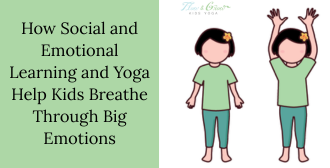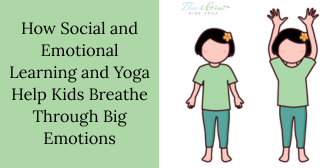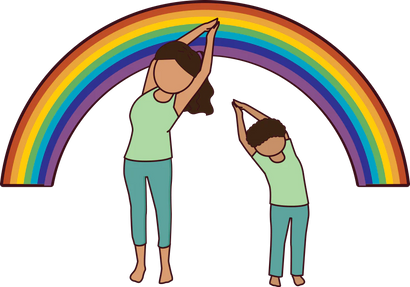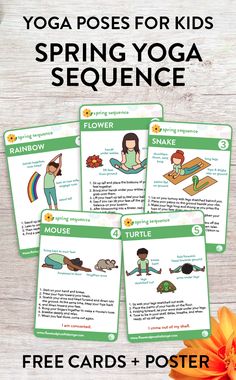Your Cart is Empty
22% off Automatically at checkout when you spend $5 of more!
22% off Automatically at checkout when you spend $5 of more!

Passover & Kids Yoga - Liberation for all
by Lara Hocheiser April 03, 2023 3 min read
Passover and Kids Yoga
What is Passover?
*please consider making a purchase from our shop to keep this site ad free
Passover is English for the Hebrew word Pesaḥ or Pesach.
A History: Passover is a holiday commemorating the Jews escape from slavery in Egypt. According to the old testament, there were 10 plagues, a series of increasingly horrific plights that G-D afflicted on the Egyptians to convince their Pharaoh to free the Jews from slavery. The plagues culminated in the death of the first born, for which is Jews were "passed over." The Pharaoh refused to free the Jewish people despite diplomatic please and the ensuing plagues. Every year in Jewish gatherings, we repeat the phrase "let my people go." That phrase was said to be uttered by Moses to the Pharaoh. The Jewish people, led by Moses, eventually fled for their lives and freedom into the harsh deserts.
The holiday is known for the Passover Seder, a meal in which a symbolic plate of food is a reminder of the tears shed during slavery, the bitterness of that time, as well as a sweet food that represent the brick and mortar that the Jews were forced to build for the Egyptian Pharaoh.
I include this image of a forward fold, a symbol of letting go, bowing your head in surrender.
Why does story telling matter??
Storytelling is a human need. We have shared stories for as long as we have had language. The story of Passover is a reminder that freedom is a human right and that to fight for it means brave people need to take a stand. It connects to so many current and recent systems of oppression that in some cases, were overthrown, and yet the persecution is perpetuated in other ways. The Jews, much like the African Americans, have faced systemic oppression through the ages.What other groups face oppression and slavery?
In Yoga, we teach of Ahimsa, or the practice of non-harm. Slavery is in its essence harmful. In kids yoga philosophy we practice Satya, or non-lying. The stories people tell themselves to systematically enslave or otherwise oppress "othered" groups goes against this key belief system. When we check in with ourselves, we can ask ourselves what else can and should we do to fight against these systems of oppression? In our work with children, we must continue to shine light on these injustices and inspire children with empowerment, knowledge, and strength to stand up for the "othered" people. That is what the heart of yoga would ask of us. Each person can find their own way to stand up against slavery, oppression, and injustice.
How are children involved in a Passover Seder?
I grew up Jewish and a memory I hold dear is the youngest child asking the 4 questions. Now as a mother, I look forward to my own children and family members asking these questions. The answers can be reflections that the children discover inside themselves from being taught the story of the Israelites. The process of self-reflection is a big part of both yoga and Judaism.
Here are the 4 questions:
"What makes this night different from all [other] nights?
1) On all nights we need not dip even once, on this night we do so twice?
2) On all nights we eat chametz or matzah, and on this night only matzah?
3) On all nights we eat any kind of vegetables, and on this night maror?
4) On all nights we eat sitting upright or reclining, and on this night we all recline?"
-Chabad.org
How can you tie history, reflection, and tradition into your yoga, SEL, or mindfulness classes?
This is a question I will leave with you, the teachers of our community. Please share your reflections in the comments.
Leave a comment
Comments will be approved before showing up.
Also in Kids Yoga Blog

How Social and Emotional Learning and Yoga Help Kids Breathe Through Big Emotions
by Kane SEO April 21, 2025 4 min read

How Social and Emotional Learning and Yoga Help Kids Breathe Through Big Emotions
by Kane SEO April 14, 2025 4 min read
In classrooms and communities around the world, educators and parents alike are placing a growing emphasis onsocial and emotional learning. And for good reason: helping children understand, manage, and express their emotions in healthy ways is just as critical as teaching them to read or do math.

Power of Yoga for Kids: How It Helps Them Grow, Focus, and Thrive
by Kane SEO March 25, 2025 5 min read
In today’s fast-paced world, children are often exposed to stressors from a young age, whether it’s academic pressure, social challenges, or the overwhelming influence of digital devices. This can impact their physical, mental, and emotional well-being.
Ultimate Kids Year of Yoga Bundle
bundlespricey-contentdigital-resourcesearly-childhood-yoga-mindfulnesselementary-yoga-mindfulnesskids-yoga-resourcesmiddle-high-school-yoga-mindfulnessseasonal-yogayoga-cards
Ultimate Kids Year of Yoga Bundle
5 reviews
5.0 / 5.0
(5) 5 total reviews
$45.00
Ultimate Kids Year of Yoga Bundle
5 reviews
5.0 / 5.0
(5) 5 total reviews
$45.00
Kid’s Sun Salutation Yoga Cards
digital-resourcesearly-childhood-yoga-mindfulnesselementary-yoga-mindfulnesskids-yoga-resourcesliteracyunder-15yoga-cards
Kid’s Sun Salutation Yoga Cards
3 reviews
4.33 / 5.0
(3) 3 total reviews
$10.00
Kid’s Sun Salutation Yoga Cards
3 reviews
4.33 / 5.0
(3) 3 total reviews
$10.00
Yamas and Niyamas: Successful Relationships with Self & Others (tweens and teens)
pricey-contentdigital-resourceskids-yoga-resourceslesson-plansmiddle-high-school-yoga-mindfulnessmindfulness
Yamas and Niyamas: Successful Relationships with Self & Others (tweens and teens)
2 reviews
5.0 / 5.0
(2) 2 total reviews
$49.00$55.00
Yamas and Niyamas: Successful Relationships with Self & Others (tweens and teens)
2 reviews
5.0 / 5.0
(2) 2 total reviews
$49.00$55.00
















